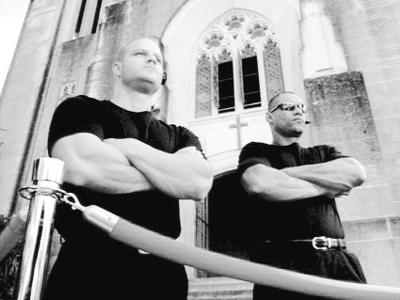TV spot presses for sexual orientation, racial tolerance, but CBS, NBC nix commercial buy
Two national networks declined to air a TV commercial, produced on behalf of the United Church of Christ, that seeks to encourage racial and sexual orientation tolerance amongst Christian churchgoers.
The commercial begins with two burly night-club bouncers working the ropes in front of a church. Two men holding hands approach and are shoved aside with a severe “No, step aside please.” A family of four is let through, their Caucasian skin suddenly conspicuous when the bouncers afterward stop a Latino man and girl at the ropes.
The screen goes black and a message reads, “Jesus didn’t turn people away. Neither do we.” A narrator ends the ad with the words, “The United Church of Christ. No matter who you are or where you are on life’s journey, you’re welcome here.”
The “Night Club” ad is the opening piece in a four-year long, $1.7million television outreach campaign for the United Church of Christ (UCC), meant to culminate in 2006 on the church’s 50th anniversary.
“People these days feel alienated from the church, and this campaign was to let people know that there is an approach to Christianity that doesn’t alienate people because of who they are,” said Rev. Ben Guess, the UCC’s news service director.
The piece ran on several local stations earlier this year in Oklahoma City, Springfield, Massachusetts, York, Pennsylvania, and Raleigh-Durham, North Carolina. However, when the UCC tried to buy airtime on the national networks, both CBS and NBC rejected the ad.
While NBC simply termed the ad “too controversial,” CBS sent a written explanation to the UCC.
“CBS/UPN Network policy precludes accepting advertising that touches on and/or takes a position on one side of a current controversial issue of public importance,” the letter read. “Because this commercial touches on the exclusion of gay couples and other minority groups by other individuals and organizations, and the fact that the Executive Branch has recently proposed a Constitutional Amendment to define marriage as a union between a man and a woman, this spot is unacceptable for broadcast on the Networks.”
ABC has a blanket policy of never running ads for religious groups. However the ABC Family cable channel has run the piece. The ad has also run on BET, Fox TV, TNT, Discovery and TV Land, among other TV and cable networks.
According to Guess, the UCC was confident there would be no problem placing the ad because in its local run not a single complaint was lodged with the church, the stations or the FCC.
“They [CBS] obviously targeted the gay couple, when we were trying to show our policy of radical inclusion,” he said, referring to the church’s broad policy of non-discrimination.
Guess added that the commercial in no way addressed the subject of gay marriage or even tried to make it appear the gay couple was heading toward the church for their wedding ceremony.
“The ad was intended to be allegorical,” he said. “There aren’t bouncers standing in front of churches, but there are many subtle and not so subtle ways people feel alienated from churches.”
Rev. Robin Meyers, pastor of the largest UCC church in Oklahoma City, contends that CBS and NBC fear a conservative backlash if they run “Night Club,” especially after the November 2 election.
“They [the networks] ran ads during the campaign that took up the controversial issues of gay marriage, ads put out by the Republican Party, that embraced and exploited stereotypes,” he said. “But they won’t run an ad that implies some churches won’t welcome gays and lesbians.”
Meyers also said that CBS had pre-screened the ad with focus groups that included the Faith and Values Coalition, who objected strongly to the ad.
“The Christian right feels deeply guilty they have excluded gays and lesbians probably because deep down they know what they have done is wrong. That what they are doing is irreligious,” said Meyers.
Neither CBS nor NBC return several phone calls seeking comment.



































